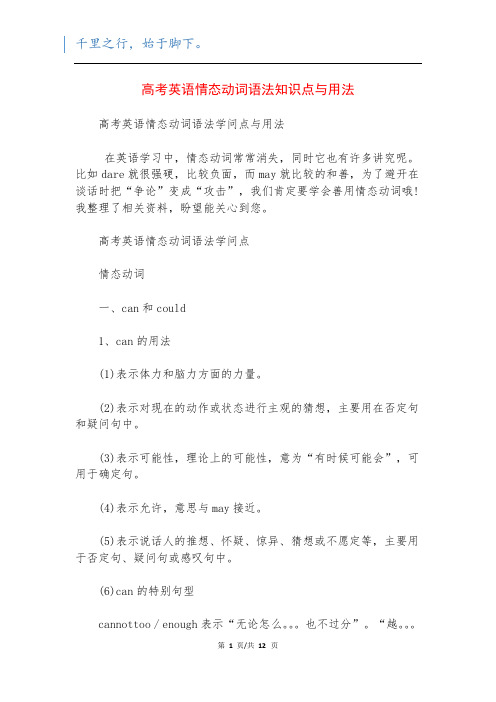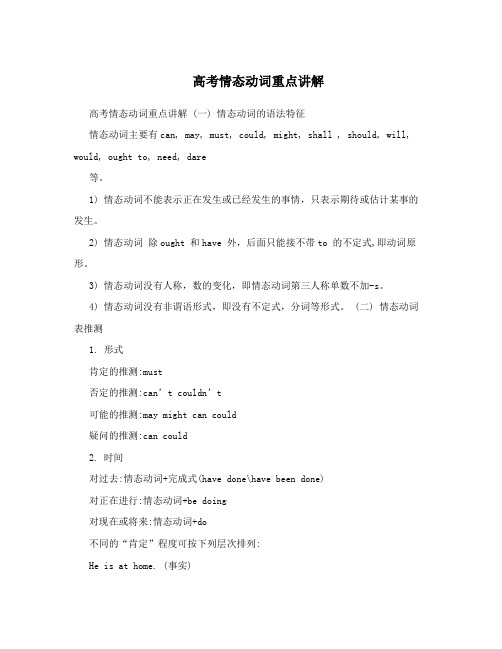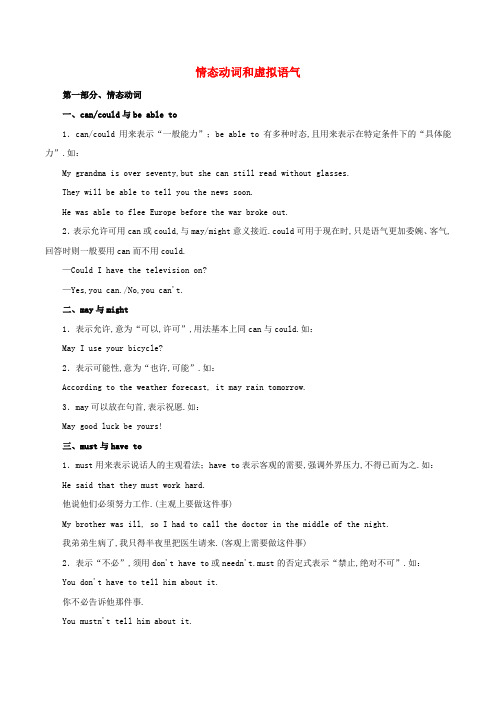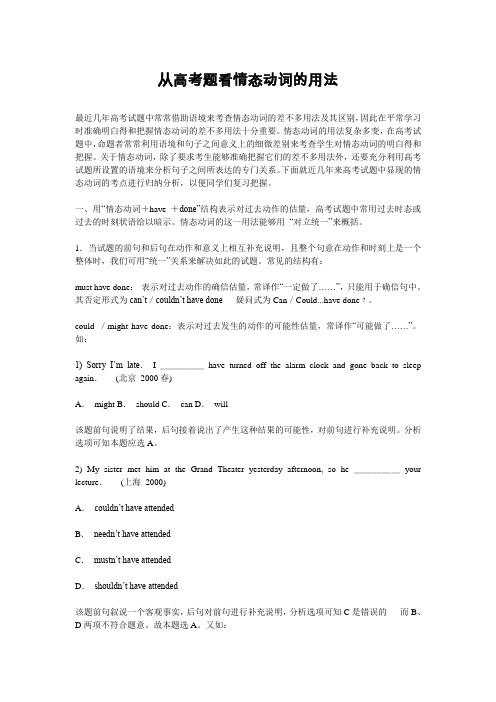高考情态动词考点分析及解题技巧
高考英语情态动词语法知识点与用法

高考英语情态动词语法知识点与用法高考英语情态动词语法学问点与用法在英语学习中,情态动词常常消失,同时它也有许多讲究呢。
比如dare就很强硬,比较负面,而may就比较的和善,为了避开在谈话时把“争论”变成“攻击”,我们肯定要学会善用情态动词哦!我整理了相关资料,盼望能关心到您。
高考英语情态动词语法学问点情态动词一、can和could1、can的用法(1)表示体力和脑力方面的力量。
(2)表示对现在的动作或状态进行主观的猜想,主要用在否定句和疑问句中。
(3)表示可能性,理论上的可能性,意为“有时候可能会”,可用于确定句。
(4)表示允许,意思与may接近。
(5)表示说话人的推想、怀疑、惊异、猜想或不愿定等,主要用于否定句、疑问句或感叹句中。
(6)can的特别句型cannottoo / enough表示“无论怎么。
也不过分”。
“越。
越好”。
cannot but+ do sth.表示“不得不,只好”。
2、could的用法(1)表示力量,指的是过去时间。
(2)表示允许,指的是过去时间。
(3)表示可能,可以指过去时间,也可以指现在时间,表示语气缓和。
(4)委婉客气地提出问题或陈述看法,指的是现在时间。
主要用于疑问句,回答时用can。
3、can与could的区分can表推想时只用于否定句和疑问句(could无此限制)。
couldnt 的可能性比cant小。
4、can与be able to的区分(1)现在时:无区分,但后者不常用。
(2)完成时;can没有完成时,此时要用have(has,had)been able to。
(3)将来时:can没有将来时,要用will be able to。
(4)过去时:could表示一般力量,was/were able to 表示在详细场合通过努力胜利做成某事的力量。
二、may 和might1、may的用法(1)表示询问或说明一件事可不行以做。
(2)表示一件事或许会发生或某种状况可能会存在,通常用在确定句和否定句中。
情态动词高中知识点高三

情态动词高中知识点高三情态动词是一类具有特殊意义和用法的动词,它们在句子中一般与实义动词连用,表示说话人的推测、命令、请求、建议等情态。
在高中英语学习中,掌握情态动词的正确用法至关重要。
本文将介绍情态动词的相关知识点,帮助高三学生更好地运用这一语法现象。
一、情态动词的定义情态动词,又称情态助动词,是用来表示说话人对某种动作或状态的态度、推测、可能性、能力、意愿、义务等情态的一类特殊动词。
常见的情态动词包括can、could、may、might、must、shall、should、will、would等。
二、情态动词的用法1. 表示能力情态动词can表示某人具有能力或可能做某事,could用于过去说法。
例如:- She can speak three languages fluently.(她能说流利的三种语言)- He could lift the heavy boxes when he was younger.(他年轻时能搬起这些沉重的箱子)2. 表示推测和可能性情态动词may、might、could用于表示推测和可能性。
may用于表示较为肯定的推测,might和could表示推测的可能性较小。
例如:- The weather is cloudy, it may rain later.(天气多云,可能会下雨)- He might be late for the meeting.(他可能会迟到会议)3. 表示义务和建议情态动词must表示说话人对某种行为具有强烈的责任感或坚决要求,should表示建议。
例如:- We must obey the laws of the country.(我们必须遵守国家的法律)- You should apologize to your friend for your mistake.(你应该为你的错误向朋友道歉)4. 表示许可和请求情态动词can、may、could用于表示允许和请求。
高考英语新情态动词知识点

高考英语新情态动词知识点在高考英语中,情态动词一直是一个重要的语法知识点。
近年来,对于新情态动词的考查也逐渐增多。
新情态动词包括 ought to、have to、be supposed to 等,它们在用法和语义上都有其独特之处。
首先,我们来看看 ought to。
ought to 表示“应该”,语气比 should 稍强。
它常用于表示责任、义务或正确的做法。
例如:“You ought to study harder if you want to get good grades”(如果你想取得好成绩,你应该更努力学习。
)需要注意的是,ought to 的否定形式是 ought not to,疑问形式是将 ought 提前。
接着是 have to。
have to 强调由于外部的客观原因而“不得不”做某事。
它有人称、数和时态的变化。
比如:“I have to go now because it's getting late”(我现在得走了,因为天色已晚。
)“She had to stay athome yesterday because she was ill”(她昨天不得不待在家里,因为她生病了。
)与 must 不同,must 通常表示主观上的“必须”,而 have to 更侧重于客观上的无奈。
再来说说 be supposed to。
这个短语有多种含义,常见的有“应该;被期望”。
“You are supposed to arrive on time”(你应该准时到达。
)它还可以表示“本应;本该”,用来表示某事没有按照预期发生。
例如:“The train was supposed to leave at 9 o'clock, but it's delayed”(火车本该 9 点出发,但晚点了。
)在具体的语境中,这些新情态动词的运用需要我们仔细分辨。
比如,在表达建议时,ought to 可能更合适;在强调客观条件限制时,have to 更为准确;而 be supposed to 则在描述期望和规定方面用得较多。
高考情态动词重点讲解

高考情态动词重点讲解高考情态动词重点讲解 (一) 情态动词的语法特征情态动词主要有can, may, must, could, might, shall , should, will, would, ought to, need, dare等。
1) 情态动词不能表示正在发生或已经发生的事情,只表示期待或估计某事的发生。
2) 情态动词除ought 和have 外,后面只能接不带to 的不定式,即动词原形。
3) 情态动词没有人称,数的变化,即情态动词第三人称单数不加-s。
4) 情态动词没有非谓语形式,即没有不定式,分词等形式。
(二) 情态动词表推测1. 形式肯定的推测:must否定的推测:can’t couldn’t可能的推测:may might can could疑问的推测:can could2. 时间对过去:情态动词+完成式(have done\have been done)对正在进行:情态动词+be doing对现在或将来:情态动词+do不同的“肯定”程度可按下列层次排列:He is at home. (事实)He must be at home.(非常肯定的推断)He could be at home.(很可能)He ought to be at home.(很可能)He may be at home.(仅仅可能而已)He might be at home.(或许, 非常不确定)He might not be at home.(也许不在家)He may not be at home. (比might可能)He couldn’t be at home.(很可能不在家)He can’t be at hom e.(一定不在家)He isn't at home.(事实)(三) 高考常用情态动词辨析1. can\ could\ be able to表示能力can和be able to都表示能力(Ability),意思上没多大区别。
高考英语情态动词知识梳理与精题分析

高考英语情态动词知识梳理与精题分析内容解读1.准确把握情态动本身的意义和用法。
包括can, may, must, will, shall, would, should, could, ought to, might, dare, need等。
2.准确把握情态动词的推测、判断用法。
3.准确把握情态动词在虚拟语气句子结构中的使用。
能力解读1.了解常见情态动词的语法特征、语义特征及相互间的区别:2.能够根据上下文的意思来确定情态动词的应用。
命题规律1.情态动词和虚拟语气在近几年高考中均是重点项目。
根据对以上各题的分析,高考的热点依次是:①推测和可能性;②"情态动词+ have done"结构;③虚拟语气;④shall, should, can 和must 表示特定语气。
2.试题的立意不偏不怪,但是有效信息越来越隐蔽,情景越来越生动、真实,考查角度越来越细微化、综合化,而这些因素都增加了试题的难度。
每年高考的单项填空部分必然有一道考查情态动词的题目,这一点是不会动摇的。
试题的特征不会有显著变化,即:立意仍将不偏不怪,情景仍将逼近真实,设问角度仍将综合化和细微化。
突破方法1.学习和掌握情态动词的意义和用法,应遵循如下步骤:①阅读语法参考书,首先从整体上把握情态动词的语法特征和语义特征;②逐个学习,了解每个情态动词的用法特征;③认真区别具有相同功能的、意思相近的情态动词的用法;④收集大量真实的口语材料(如教材中的对话材料及听力材料),在真实的实际情景中印证和领悟它们的用法特征。
2.解答情态动词类的题目时,一定要细细领会情景特征,情景中没有废话,不要放过任何细节。
只有这样,才会找到足够的有效信息,做出最佳选择。
3.一定要将上面的提到的高考热点落到实处,反复咀嚼,反复演练,确保精通。
知识梳理梳理一情态动词的类型和特征一、情态动词的类型1.只作情态动词用的有:must, can (could), may (might), ought to;2.可作情态动词也可作实义动词的有:need, dare (美语中常用作实义动词);3.可作情态动词也可作实义动词的有:shall (should), will (would);4.具有情态动词的某些特征的有:have (had) to, used to。
高考英语二轮复习情态动词和虚拟语气考点讲解含解析

情态动词和虚拟语气第一部分、情态动词一、can/could与be able to1.can/could用来表示“一般能力”;be able to有多种时态,且用来表示在特定条件下的“具体能力”.如:My grandma is over seventy,but she can still read without glasses.They will be able to tell you the news soon.He was able to flee Europe before the war broke out.2.表示允许可用can或could,与may/might意义接近.could可用于现在时,只是语气更加委婉、客气,回答时则一般要用can而不用could.—Could I have the television on?—Yes,you can./No,you can't.二、may与might1.表示允许,意为“可以,许可”,用法基本上同can与could.如:May I use your bicycle?2.表示可能性,意为“也许,可能”.如:According to the weather forecast, it may rain tomorrow.3.may可以放在句首,表示祝愿.如:May good luck be yours!三、must与have to1.must用来表示说话人的主观看法;have to表示客观的需要,强调外界压力,不得已而为之.如:He said that they must work hard.他说他们必须努力工作.(主观上要做这件事)My brother was ill, so I had to call the doctor in the middle of the night.我弟弟生病了,我只得半夜里把医生请来.(客观上需要做这件事)2.表示“不必”,须用don't have to或needn't.must的否定式表示“禁止,绝对不可”.如:You don't have to tell him about it.你不必告诉他那件事.You mustn't tell him about it.你绝不能告诉他那件事.—Must we do it now?我们必须现在做吗?—No, you needn't.不,你们不必.四、shall1.用于第一、第三人称的疑问句中,用来征求对方的意见或请求指示.如:What shall he do next?他下一步干什么呢?2.用于第二、第三人称的陈述句中,表示说话人的意愿,有“命令、警告、允诺、威胁、强制”等意思.如:He shall stay in bed.他必须躺在床上.You shall have it back next week.下周一定还你.He says he won't go, but I say he shall.他说他不去,但我说他必须去.五、will与would1.will用于各种人称,表示“意志、意愿”或“决心”等.如:If you will keep your watch half an hour slow, it is hardly surprising that you are late for your appointments.如果你想要让你的表慢半个小时,你约会时迟到就不足为怪了.2.will表示习惯性的动作,有“总是,惯于”的含义.如:An Englishman will usually show you the way in the street.英国人通常是会在街上给你指路的.3.would可表示过去反复发生的动作.如:On Sundays he would get up early and go fishing.星期天他总是早起去钓鱼.六、should与ought to1.should表示“建议”或“劝告”,有“应该”之意.如:You should learn from each other.2.ought to表示根据某种义务或必要“应当”做某事.如:Everyone ought to obey the traffic regulations.3.should和ought to也可用来表示推测,意为“想必会……”.如:—When can I come for the photos? I need them tomorrow afternoon.—They should be ready by 1200.七、情态动词表示推测1.can用于肯定句中表示客观的可能性,意为“有时会”;用于疑问句中可以表示推测,意为“可能”,有时表示一种惊讶的语气;用于否定句中也可以表示推测,can't意为“不可能”,语气很强烈.It is usually warm in my hometown in March, but it can be rather cold sometimes.我的家乡在三月份通常很暖和,但有时候也会相当冷.Mr. Bush is on time for everything. How can it be that he was late for the meeting?布什先生做什么事情都很准时,他怎么可能开会迟到呢?—Let's visit Tom together, Stephen.—There's no need to do so. He can't be at home, because I saw him board the flight to Beijing this morning.——Stephen,咱们一起拜访汤姆吧.——没必要这样做.他一定不在家,因为今天早晨我看见他登上了飞往北京的航班.2.may/might用于肯定句中可以用来表示不十分肯定的推测,意为“有可能”;用于否定句中也可以表示推测,may not意为“可能不”,表示一种不太确定的语气.The traffic is heavy these days. I might arrive a bit late, so could you save me a place?这些天交通很繁忙,我可能会来晚一点,请你帮我保留个位置好吗?3.must表示推测时只能用于肯定句中,意为“一定,必定”,表示十分肯定的语气(在疑问句中或否定句中要用can/could).—It's the office! So you must know eating is not allowed here.—Oh, sorry.——这是办公室!所以你一定知道这里不许吃东西.——噢,对不起.4.should用来表示推测时意为“应该”,即含有“按道理来说应当如此”的意思.There shouldn't be any difficulty about passing the road test since you have practiced a lotin the driving school.因为你在驾校训练了这么多,通过路考应该没什么困难.八、“情态动词+have done”结构1.should/ought to+have done,表示“过去本应该做而(实际)没有做的事情”,含有责备或遗憾的语气,意为“本应该……”.其否定形式为“should not/ought not to have+done”,表示某种行为本不该发生但实际上发生了.I shouldn't have watched that movie—it'll give me horrible dreams.我本不应该看那部电影——它会令我做噩梦.You ought to have come to the party yesterday, but why didn't you come?昨天你本来应该参加聚会的,可是你为什么不来?2.must+have done,用于肯定句,表示“过去一定做过某事”,表示一种很有把握的推测.注意,对过去发生的情况的否定推测常用“can't/couldn't+have done”表示.—Ye Shiwen won two gold medals in London Olympic Games.—She must have gone through tough training.——叶诗文在伦敦奥运会获得了两枚金牌.——她肯定受到严格的训练.—Do you know where David is? I couldn't find him anywhere.—Well. He can't have gone far—his coat's still here.——你知道大卫在哪里吗?我到处找不到他.——大卫的上衣还在这里,因此他肯定没走远.3.needn't+have done,表示“过去没有必要做某事,但实际上做了某事”.Mark needn't have hurried. After driving at top speed, he arrived half an hour early.马克本没必要那么匆忙.他以最快速度开车,结果早到了半个小时.4.may/might+have done,表示对过去情况的一种不太有把握的可能性的推测,表示“可能已做了某事……”,否定句表示“可能还没有……”.Sorry, I'm late. I might have turned off the alarm clock and gone back to sleep again.对不起,我迟到了.我可能把闹钟关掉后又睡着了.5.could+have done表示“过去本来可以做某事,但实际上没有做”;can/could+have done表示“过去可能做了某件事”.I could have saved the poor rabbit, but I didn't have the right drugs with me at that moment.我本来可以拯救那只可怜的兔子的,可是我当时没有合适的药品.第二部分、虚拟语气一、虚拟语气在虚拟条件句中的用法1.在具体运用中,条件从句中有时可省略if而采用倒装结构.如:Had it not been for your help, we wouldn't have achieved so much.2.介词without/but for、连词but、副词otherwise常用来表示某种假设条件.如:I wouldn't have made such rapid progress without your help.3.有时候从句动作和主句动作发生的时间不一致,这时谓语动词的形式要根据各自的时间来调整.如:If the weather had been more favourable, the crops would be growing still better.二、“should+动词原形”表示的虚拟语气这一类型常见词有“一坚持(insist)、二命令(order, command)、三建议(advise, suggest, propose)、四要求(request, require, demand, desire)”.以上词及其派生名词所接的名词性从句都使用“(should +)动词原形”的虚拟语气.①Jane's pale face suggested that she was ill, and her mother suggested that she(should) havea medical examination.简苍白的脸色表明她病了,她母亲建议她去检查身体.②She insisted that the man had stolen her car and that he(should) be sent to prison.她坚持说那个男人偷了她的车,并坚决要求他坐牢.三、特殊句式中的虚拟语气If only/It's (high) time (that)...wish/would rather/as if等固定句式要求用相应的虚拟语气表达形式.①I wish I could fly.真希望我能飞.②I would rather you came tomorrow.我宁愿你明天来.③If only I had taken your advice!要是听从了你的建议该多好啊!高频考点一、考查情态动词例1.(2018·北京卷)In today’s information age, the loss of data _________ cause serious problems for a company.A. needB. shouldC. canD. must【答案】C【解析】考查情态动词.句意:在今天的信息时代,数据的丢失有时会对一个公司造成严重的问题.数据丢失造成严重问题是客观上会发生的情况,即“客观可能性”,故该空应用情态动词can.C选项正确.其余情态动词均没有该用法.need需要;should应该,竟然;must必须,肯定.【变式探究】—Can’t you stay a little longer?—It’s getting late. I reall y _____go now, My daughter is home alone.A .mayB .canC . mustD .dare【答案】C【解析】句意:——你不能再多待会儿吗?——很晚了,我必须得走了.我女儿一个人在家.A. may可能,可以,也许;B. can能,会;C. must必须,必然要,必定会;D. dare敢,胆敢.结合句意,故选C.【变式探究】________ I have a word with you? It won’t take long.A. CanB. MustC. ShallD. Should【答案】A【解析】本题考察的是情态动词基本意义辨析.Can能够,可能;must必须,一定;非得;shall将要;should应该;句意:我可以和你谈谈吗?不会花很多时间的.根据句意可知本题使用can I…?表示询问对方是否允许.如:Can I use your dictionary?我可以使用你的字典吗?故A正确.高频考点二、考查情态动词的用法例2. (2018·天津卷) I can't find my purse. I___________ it in the supermarket yesterday, but I'm not sure.A. should leaveB. must have leftC. might leaveD. could have left【答案】D【解析】考查情态动词表推测.句意:我不能找到我的钱包了,昨天我有可能把它落到超市了,但我不确定.根据句中时间状语yesterday可知,是对过去事情的推测,故用情态动词+ have done,再根据后句but I’m not sure.可知,此推测为不能肯定的推测,故用情态动词could,表示“可能”.故选D.【变式探究】(2017•天津)My room is a mess, but I __________clean it before I go out tonight.I can do it in the morning.A. daren’tB. shouldn’tC. needn’tD. mustn’t【答案】C【解析】句意:我的房间很乱,但是在今晚我出去之前不需要打扫,我可以明天早晨再打扫.A.不敢;B.不应该;C不需要;D.不许.根据句意,故选C.【变式探究】Why didn't you tell me about your trouble last week?If you ________(tell)me,I could have helped.【答案】had told【解析】句意:上个星期你为什么不告诉我你的麻烦事?如果你告诉我了,我就能帮你.根据句意和相关信息判断,条件句表示与过去事实相反的假设,此时从句用过去完成时,主句谓语用“情态动词+have done”形式.【变式探究】I ______ have worried before I came to the new school, for my classmates here are very friendly to me.A. mightn’tB. mustn’tC. needn’tD. couldn’t【答案】C【解析】句意:我来新学校之前本没有必要担心,因为在这里我的同学对我非常友好.needn’t have done本没有必要做某事,表示实际上已经做了某事.根据句意可知选C.高频考点三、考查虚拟语气例3.(2019·天津卷)The workers were not better organized, otherwise they ________ the task in half the time.A.accomplished B.had accomplishedC.would accomplish D.would have accomplished【答案】D【解析】考查虚拟语气.句意:工人们没有被组织好,否则的话他们会用那一半的时间完成任务的.此处otherwise表达了一种含蓄虚拟;otherwise前的内容所述的是过去的事实,相当于if引导的条件状语从句“If the workers had been better organized”,因此后半部分应用“主语+would have done sth.”的结构.故选D.【举一反三】【2018·江苏】It’s strange that he _______have taken the books without the owner’s permission.A. wouldB. shouldC. couldD. might【答案】B【解析】考查虚拟语气.句意:真奇怪,他竟然没有主人的允许就拿走了这些书.在句型”It is important/necessary/strange/impossible/natural that...”中,其中由that引导的主语从句通常用“should+动词原形”这样的虚拟语气,其中的should可以省略.故选B.【变式探究】(2017·北京)If the new safety system _______ to use, the accident would never have happened.A. had been putB. were putC. should be putD. would be put【答案】A【解析】句意:如果这个新的安全系统被投入使用过的话,这个事故就不会发生了.根据主句确定是对过去情况的虚拟,所以从句谓语用had done形式,此外根据句意可知是被动,用被动语态,故A项是正确的.【变式探究】________(have)the governments and scientists not worked together,AIDSrelated deaths would not have fallen since their highest in 2005.【答案】Had【解析】句意:如果政府和科学家不共同努力,与艾滋病相关的死亡就不会从2005年的最高点下降.这是一个省略了从属连词if的虚拟语气句,使用了倒装句式.根据主句的would not have fallen可知,这里是表示过去的虚拟语气,所以用had.【变式探究】Without his wartime experiences, Hemingway____ his famous novel A Farewell to Arms.A.didn’t writeB. hadn’t writtenC. wouldn’t w riteD. wouldn’t have written【答案】D【解析】句意:没有他战时的经验,海明威就不可能写出著名的小说永别了武器.根据without his wartime experience没有战时的经历,可知表示对于过去的否定猜测,故主句用would have done,因此选D 项.1.(2019·天津卷)The workers were not better organized, otherwise they ________ the task in half the time.A.accomplished B.had accomplishedC.would accomplish D.would have accomplished【答案】D【解析】考查虚拟语气.句意:工人们没有被组织好,否则的话他们会用那一半的时间完成任务的.此处otherwise表达了一种含蓄虚拟;otherwise前的内容所述的是过去的事实,相当于if引导的条件状语从句“If the workers had been better organized”,因此后半部分应用“主语+would have done sth.”的结构.故选D.2.(2019·江苏卷)What a pity! You missed the sightseeing, or we ________ a good time together.A.had B.will haveC.would have had D.had had【答案】C【解析】考查虚拟语气.句意:多么遗憾!你错过了这次游览.否则,我们就可以一起度过一段愉快的时光.根据关键词or可知,这里表示与过去的事实相反,谓语动词应用would/could/should/might+have done.1.【2018·江苏】 There is a good social life in the village, and I wish I _______ a second chance to become more involved.A. hadB. will haveC. would have hadD. have had【答案】A【解析】考查虚拟语气.句意:在这个村里有很好的社交生活,并且我希望我再有机会去更多的参与.本题考查wish引导的宾语从句,表示与现在事实相反的愿望,所以从句用一般过去时.故选A.2.【2018·江苏】It’s strange that he _______have taken the books without the owner’s permission.A. wouldB. shouldC. couldD. might【答案】B【解析】考查虚拟语气.句意:真奇怪,他竟然没有主人的允许就拿走了这些书.在句型”It isimport ant/necessary/strange/impossible/natural that...”中,其中由that引导的主语从句通常用“should+动词原形”这样的虚拟语气,其中的should可以省略.故选B.3.(2018·天津卷) I can't find my purse. I___________ it in the supermarket yesterday, but I'm not sure.A. should leaveB. must have leftC. might leaveD. could have left【答案】D【解析】考查情态动词表推测.句意:我不能找到我的钱包了,昨天我有可能把它落到超市了,但我不确定.根据句中时间状语yesterday可知,是对过去事情的推测,故用情态动词+ have done,再根据后句but I’m not sure.可知,此推测为不能肯定的推测,故用情态动词could,表示“可能”.故选D.4.(2018·北京卷)In today’s information age, the loss of data _________ cause serious problems for a company.A. needB. shouldC. canD. must【答案】C【解析】考查情态动词.句意:在今天的信息时代,数据的丢失有时会对一个公司造成严重的问题.数据丢失造成严重问题是客观上会发生的情况,即“客观可能性”,故该空应用情态动词can.C选项正确.其余情态动词均没有该用法.need需要;should应该,竟然;must必须,肯定.5.(2018·北京卷)They might have found a better hotel if they _________ a few more kilometers.A. droveB. would driveC. were to driveD. had driven【答案】D【解析】考查虚拟语气.句意:如果他们多开几公里的话,他们也许会找到一个更好的旅馆.由“they might have found a better hotel”可知,该句是表示对过去的虚拟.if ____ a few more kilometers是条件句部分,表示对过去的虚拟,条件句部分要用过去完成时态,故D选项正确.1.(2017·北京)Samuel, the tallest boy in our class, ______ easily reach the books on the top shelf.A. mustB. shouldC. canD. need【答案】C【解析】A. must 必须 B. should 应该 C. can 能 D. need 需要.句意:Samuel,我班最高的男生,能很轻松地够着书架顶上的书,此处需要一个表示能力的词,故用can,答案为C.2.(2017•天津)My room is a mess, but I __________clean it before I go out tonight. I can do it in the morning.A. daren’tB. shouldn’tC. needn’tD. mustn’t【答案】C【解析】句意:我的房间很乱,但是在今晚我出去之前不需要打扫,我可以明天早晨再打扫.A.不敢;B.不应该;C不需要;D.不许.根据句意,故选C.3.(2017•江苏) _______ not for the support of the teachers, the student could not overcome her difficulty.A. It wereB. Were itC. It wasD. Was it【答案】B【解析】考查虚拟语气和倒装.虚拟语气中,be动词统一用were;虚拟语气的省略形式主要是把if省略,同时把were/should/had提前,即Were /Should/ Had I...,故选B.句意:要不是老师们的支持,该生是无法克服她自己的困难的.4.(2017·江苏卷) ____________ not for the support of the teachers, the student could not overcome her difficulty.A. It wereB. Were itC. It wasD. Was it【答案】B【解析】考查虚拟语气的省略.虚拟语气中,be动词统一用were;虚拟语气的省略形式主要是把if省略,同时把were/should/had提前,即Were /Should/ Had I...,故选B.5.(2017•江苏) _______ not for the support of the teachers, the student could not overcomeher difficulty.A. It wereB. Were itC. It wasD. Was it【答案】B【解析】考查虚拟语气和倒装.虚拟语气中,be动词统一用were;虚拟语气的省略形式主要是把if省略,同时把were/should/had提前,即Were /Should/ Had I...,故选B.句意:要不是老师们的支持,该生是无法克服她自己的困难的.6.(2017·北京)If the new safety system _______ to use, the accident would never have happened.A. had been putB. were putC. should be putD. would be put【答案】A【解析】句意:如果这个新的安全系统被投入使用过的话,这个事故就不会发生了.根据主句确定是对过去情况的虚拟,所以从句谓语用had done形式,此外根据句意可知是被动,用被动语态,故A项是正确的.1.(2016·浙江,15)________(have)the governments and scientists not worked together,AIDSrelated deaths would not have fallen since their highest in 2005.【答案】Had【解析】句意:如果政府和科学家不共同努力,与艾滋病相关的死亡就不会从2005年的最高点下降.这是一个省略了从属连词if的虚拟语气句,使用了倒装句式.根据主句的would not have fallen可知,这里是表示过去的虚拟语气,所以用had.2.(2016·浙江,17)George can't ________(go)too far.His coffee is still warm.【答案】have gone【解析】句意:乔治不可能走得太远了.他的咖啡仍然是温的.can't have done是对过去的否定推测.3.(2016·北京,34)Why didn't you tell me about your trouble last week?If you ________(tell)me,I could have helped.【答案】had told【解析】句意:上个星期你为什么不告诉我你的麻烦事?如果你告诉我了,我就能帮你.根据句意和相关信息判断,条件句表示与过去事实相反的假设,此时从句用过去完成时,主句谓语用“情态动词+have done”形式.。
高考英语 情态动词使用技巧及形容词排序素材

20个情态动词使用技巧情态动词的语法特征1〕情态动词不能表示正在发生或已经发生的事情,只表示期待或估计某事的发生;2〕情态动词除ought 和have 外,后面只能接不带to 的不定式;3〕情态动词没有人称,数的变化,即情态动词第三人称单数不加-s;4〕情态动词没有非谓语形式,即没有不定式,分词,等形式。
一、比较can 和be able to1〕can could 表示能力;可能(过去时用could),只用于现在式和过去式(could)。
be able to可以用于各种时态。
They will be able to tell you the news soon. 他很快就能告诉你消息了。
2〕只用be able to a. 位于助动词后。
b. 情态动词后。
c. 表示过去某时刻动作时。
d. 用于句首表示条件。
e. 表示成功地做了某事时,只能用was/were able to,不能用could。
He was able to flee Europe before the war broke out.= He managed to flee Europe before the war broke out.注意:could不表示时态1〕提出委婉的请求,〔注意在回答中不可用could〕。
—— Could I have the television on? —— Yes, you can. / No, you can't.2〕在否定,疑问句中表示推测或怀疑。
He couldn't be a bad man. 他不大可能是坏人。
二、比较may和might1〕表示允许或请求;表示没有把握的推测;may 放在句首,表示祝愿。
May God bless you! He might be at home.注意:might 表示推测时,不表示时态。
只是可能性比may 小。
2〕成语:may/might as well,后面接不带to 的不定式,意为"不妨"。
从高考题看情态动词的用法

从高考题看情态动词的用法最近几年高考试题中常常借助语境来考查情态动词的差不多用法及其区别,因此在平常学习时准确明白得和把握情态动词的差不多用法十分重要。
情态动词的用法复杂多变,在高考试题中,命题者常常利用语境和句子之间意义上的细微差别来考查学生对情态动词的明白得和把握。
关于情态动词,除了要求考生能够准确把握它们的差不多用法外,还要充分利用高考试题所设置的语境来分析句子之间所表达的专门关系。
下面就近几年来高考试题中显现的情态动词的考点进行归纳分析,以便同学们复习把握。
一、用“情态动词+have +done”结构表示对过去动作的估量,高考试题中常用过去时态或过去的时刻状语给以暗示。
情态动词的这一用法能够用“对立统一”来概括。
1.当试题的前句和后句在动作和意义上相互补充说明,且整个句意在动作和时刻上是一个整体时,我们可用“统一”关系来解决如此的试题。
常见的结构有:must have done:表示对过去动作的确信估量,常译作“一定做了……”,只能用于确信句中。
其否定形式为can’t/couldn’t have done疑问式为Can/Could...have done﹖。
could /might have done:表示对过去发生的动作的可能性估量,常译作“可能做了……”。
如:1) Sorry I’m late.I _____have turned off the alarm clock and gone back to sleep again.(北京2000春)A.might B.should C.can D.will该题前句说明了结果,后句接着说出了产生这种结果的可能性,对前句进行补充说明。
分析选项可知本题应选A。
2) My sister met him at the Grand Theater yesterday afternoon, so he _____your lecture.(上海2000)A.couldn’t have attendedB.needn’t have attendedC.mustn’t have attendedD.shouldn’t have attended该题前句叙说一个客观事实,后句对前句进行补充说明,分析选项可知C是错误的而B、D两项不符合题意。
- 1、下载文档前请自行甄别文档内容的完整性,平台不提供额外的编辑、内容补充、找答案等附加服务。
- 2、"仅部分预览"的文档,不可在线预览部分如存在完整性等问题,可反馈申请退款(可完整预览的文档不适用该条件!)。
- 3、如文档侵犯您的权益,请联系客服反馈,我们会尽快为您处理(人工客服工作时间:9:00-18:30)。
高考英语情态动词考点分析及解题技巧宁夏石嘴山市光明中学张世忠【摘要】情态动词是高中英语语法教学的重点,是高考的一个热点,也是学生学习的难点,本文对近几年高考情态动词的考点进行归纳总结,并探讨其解题技巧。
【关键词】情态动词,考点,解题技巧情态动词是近几年高考的一个热点,全国各省市的高考题中每年都有对情态动词这一内容的考查,它也是学生学习的难点。
对于情态动词,除了要求考生能够准确掌握它们的基本用法外,还要充分利用高考试题所设置的语境来分析句子之间所体现的特殊关系。
下面就近几年来高考试题中出现的情态动词的考点进行归纳分析,旨在帮助师生掌握其用法。
一、考查情态动词基本用法之间的比较和辨析请看下面各题:例1. Just be patient .You _________ expect the World to change so soon.(2010年全国Ⅰ)A. can’tB. needn’tC. may notD. will not解析:本题考查情态动词can, need ,may, will 的否定式的基本用法,cannot 表示“不能”;need not 表示“不必要”;may not 表示“可能不” will not 表示“不愿意,拒绝”本句意思为“耐心些,你不能期望很快改变现状”,故选A例2. —Could I have a word with you, mum?—Oh, dear, if you ______. (2006年浙江卷)A. canB. mustC. mayD. should解析:考查情态动词must的基本用法,“一定要,坚持要做……”,答案为B。
例3. We hope that as many people as possible _________join us for the picnic tomorrow.(2006年全国卷II)A. needB. mustC. shouldD. can解析:本题考查情态动词can的基本含义“能够,会”,故本题选D。
小结:我们在做这样的试题时应认真分析语境中所含的实际意义,并结合情态动词的1.考查对现在和将来状况的推测和可能性请看下面各题:例4. I’m afraid Mr. Harding ________see you now. He’s busy.(2010年全国Ⅱ)A. can’tB. mustn’tC. shouldn’tD. needn’t解析:答案选A。
考查情态动词表推测的用法。
can 表推测,用于否定句中,表示“不可能”其他选项不符题意。
例5 The traffic is heavy these days .I __________ arrive a bit late ,so could you save me a place?(2009年辽宁卷)A.can B.must C. need D. might解析:根据句意:“最近这些天交通拥挤。
我有可能迟到一会儿,因此请你给我留个位子好吗?”can 能,会;must必须,一定;need需要都不符合题意,might 表示可能性,指较小的可能性,符合句意,所以答案是D例6 There is no lights on, they __________ be at home. (2006年全国卷I)A . can’t B. mustn’t C. needn’t D. shouldn’t解析:分析语境可知,后句是根据前句所提供事实的一种推测,can’t 表示“不可能”,mustn’t表示“禁止,不准”,needn’t表示“不必要”,shouldn’t表示“不应该”,故本题选A。
小结:考查对现在和将来状况的推测和可能性时,表示肯定用must一定;should/ought to 理应;will很可能,大概;would 可能性比will 小;may 可能,或许,说不定;might 也许(可能性小于may),表示否定用will not 不会,不该;would not 语气比won’t 弱;can not 不可能;could not 语气比can not 弱;may not 可能不。
(见下表)2、考查对已经过去的情况的推测请看下面各题:例7. It ________ have been Tom that parked the car here, as he is the only one with a car.(2009 上海)A. mayB. canC. mustD. need解析:本题考查must﹢have done对过去情况的肯定的推测用法,表示“过去一定……”答案选C例8. .He did not regret saying what he did but felt that he __________ it differently.(2009 江苏)A. could expressB.would expressC. could have expressedD. must have expressed解析:本句句意为:“他不后悔说了他做了什么,而认为他本能够用不同的方式表达。
”could express 能够表达;would express 要表达;could have expressed 本来能够表达;must have expressed(表推测)肯定已经表达。
所以答案应选C例8 But for their help , we ________ the program in timeA. can not finishB. will not finishC. had not finishedD. could not have finished解析:本句句意为:“如果不是他们的帮助,我们就不能及时完成这个项目”所以选D could not have finished 表示与过去相反。
例9 My sister met him at the Grand Theater yesterday afternoon, so he _____your lecture.(上海2000)A.couldn't have attendedB.needn't have attendedC.mustn't have attendedD.shouldn't have attended解析:该题前句叙说一个客观事实,后句对前句进行补充说明,分析选项可知C是错误的而B、D两项不符合题意。
故本题选A。
小结: 用“情态动词+have +done”结构表示对过去动作的推测,高考试题中常用过去时态或过去的时间状语给以暗示。
情态动词的这一用法可以用“对立统一”来概括。
1.当试题的前句和后句在动作和意义上相互补充说明,且整个句意在动作和时间上是一个整体时,我们可用“统一”关系来解决这样的试题。
常见的结构有:must have done 表示对过去动作的肯定推测,常译作“一定做了……”,只能用于肯定句中。
其否定形式为can't/couldn't have done表示“不可能……”疑问式为Can/Could...have done?。
could /might have done:表示对过去发生的动作的可能性推测,常译作“可能做了……”。
例如:Sorry I'm late.I _____have turned off the alarm clock and gone back to sleep again.(北京2000春)A.might B.should C.can D.will该题前句说明了结果,后句接着说出了产生这种结果的可能性,对前句进行补充说明。
整个句意在时间上和动作上是统一关系,分析四个选项可知本题应选A。
2.考查情态动词的虚拟用法。
当试题的前后句在动作和意义上构成转折关系时,常借助“but, however, instead”等词来表示过去的动作与客观事实不符,表示“本该……,本能够……”但实际却没有这样,这时我们就可以用“对立”关系来解决这样的试题。
这种结构常见的有:should have done /ought to have done:表示过去本应该做某事而实际上没有做。
should not have done /ought not to have done:表示过去本不应该做某事但事实上却做了。
need have done:表示过去本来有必要去做某事,但事实上没有做。
need not have done:表示过去本来没有必要做某事,但事实上却做了。
如:—I’ll tell Mary about her new job tomorrow.--You________ her last week. (2004福建)A. ought to tellB. would have toldC. must tellD. should have told对过去发生事情的责备或遗憾应用“情态动词+have + v-ed”,据此可排除答案A、C,而would+have +v-ed常用于过去的虚拟语气中,should(ought to)+ have + v-ed”表示本应该做某事而实际上没有做,含有责备的含义。
其否定式表示某种行为不该发生但却发生了。
故答案为D。
又如;He paid for a seat, when he ______ have entered free. (2005山东)A. couldB. wouldC. mustD. need“could+ have + v-ed” 用于肯定句中,表示本来能够做成某事的但结果没能做成,含有遗憾的意味,侧重有能力而没能做成。
该句意思为:“他花钱买了座位,而他本来可以免费进去的”。
答案为A。
情态动词+have done的用法见下表解题技巧一、注重语境做题时要认真研读题干所提供的句子语境,有相当一部分考题从本质上看都是在考查情态动词在具体语境中的运用,只要考生能弄清各个被考查情态动词的基本意思,和在特定语气下所表达的意思,就可作出正确选择。
如:(1) Helen ______ go on the trip with us, but she isn’t quite sure yet. (2005安徽卷)A. shallB. mustC. mayD. can分析:答案选C。
由于下句提供的语境是“她还没有把握”,所以前文要用may表示没有把握的肯定推测,即“可能会与我们去旅行”。
抓住前后句提供的语境就可确定答案。
(2) —I’ve taken someone else’s green sweater by mistake.—It ______ Harry’s. He always wears green. (2005广东卷)A. has to beB. will beC. mustn’t beD. could be分析:答案选D。
